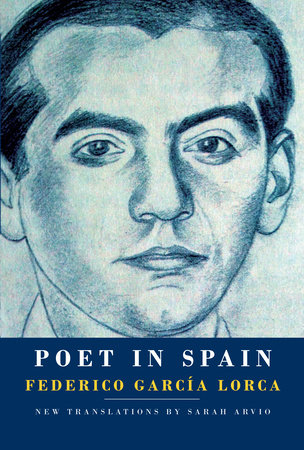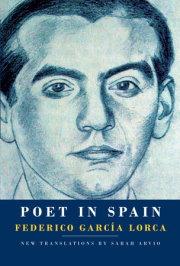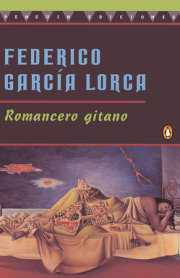For the first time in a quarter century, Poet in Spain is a major new volume of translations of the beloved poetry of Federico García Lorca, presented in a beautiful bilingual edition.
The fluid and mesmeric lines of these new translations by the award-winning poet Sarah Arvio bring us closer than ever to the talismanic perfection of the great García Lorca. Poet in Spain invokes the “wild, innate, local surrealism” of the Spanish voice, in moonlit poems of love and death set among poplars, rivers, low hills, and high sierras. Arvio’s ample and rhythmically rich offering includes, among other essential works, the folkloric yet modernist Gypsy Ballads, the plaintive flamenco Poem of the Cante Jondo, and the turbulent and beautiful Dark Love Sonnets—addressed to Lorca’s homosexual lover—which Lorca was revising at the time of his brutal political murder by Fascist forces in the early days of the Spanish Civil War. Here, too, are several lyrics translated into English for the first time and the play Blood Wedding—also a great tragic poem. Arvio has created a fresh voice for Lorca in English, full of urgency, pathos, and lyricism—showing the poet’s work has grown only more beautiful with the passage of time.
“Riveting. . . . Lorca’s poems from Spain are a poetry of dreams and journeys and glimpses from balconies, of sunbaked meadows and realms of erotic yearning. . . . Arvio is a supple translator, and she has delivered a personal book. . . . [Her] rich and gripping retranslation of ‘Blood Wedding’ [is] of a piece with Lorca’s blood-warm verse.” —Dwight Garner, The New York Times
“[Arvio’s] translations are filled with intelligent decisions and a keen sense of the music in the original poems. . . . Her ear for Lorca’s delicate and difficult tones is sensitive and sharp, indeed often inspired.” —Colm Tóibín, The New York Review of Books
“There is a deep communion between artist and translator in these subtle, nuanced, fiercely economic poems. . . . [Arvio] captures the élan and enchantment of García Lorca’s work, opening his fascinating world to a new generation of English readers.” —Lizabeth Paravisini-Gebert, The Yale Review
“A triumphant addition to the corpus of Lorca translations. . . . Arvio’s mix of careful, thoughtful research and respect for the spontaneous energy of poetry makes this volume invaluable to any English-speaker smitten by Lorca’s work.”
—August Smith, BookPage
“A beautiful English translation. . . . We see [Lorca] not as a traveler in a foreign land, as we usually do, but as a historian of his own ‘country,’ Andalusia. . . . We see that Lorca’s poetry challenged, however subtly and playfully, a vision of Spanish history that had erased ethnic minorities, especially those from Andalusia, from its annals.” —Bécquer Seguín, Slate
“Those already familiar with Mr. Lorca’s work will enjoy working through [Arvio’s] translations. . . . while newcomers will find her book an accessible and immensely useful introduction to a poet of enormous gifts and tremendous influence in Spain and South America.” —Claire Hopley, The Washington Times
“Arvio brings Lorca’s slow stylistic shift into full view, from early bright fragments and abbreviated lines to extended syllabics. . . . This omnibus volume benefits greatly from the in-depth introduction, an extensive bibliography, and several poems never before published in English.” —Diego Báez, Booklist





